Nsg 5003 week 2 test exam - Study guides, Class notes & Summaries
Looking for the best study guides, study notes and summaries about Nsg 5003 week 2 test exam? On this page you'll find 47 study documents about Nsg 5003 week 2 test exam.
Page 3 out of 47 results
Sort by
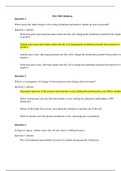
-
NSG5003 MIDTERM EXAM (2 VERSIONS) / NSG 5003 MIDTERM EXAM (LATEST, 2021): ADVANCED PATHOPHYSIOLOGY: SOUTH UNIVERSITY |100% CORRECT Q & A, DOWNLOAD TO SECURE HIGHSCORE|
- Exam (elaborations) • 86 pages • 2021
- Available in package deal
-
- $25.49
- + learn more
NSG5003 MIDTERM EXAM (2 VERSIONS) / NSG 5003 MIDTERM EXAM (LATEST, 2021): ADVANCED PATHOPHYSIOLOGY: SOUTH UNIVERSITY |100% CORRECT Q & A, DOWNLOAD TO SECURE HIGHSCORE| NSG5003 Midterm Exam / NSG 5003 Midterm Exam: Advanced pathophysiology: South University South University NSG5003 Midterm Exam / South University NSG 5003 Midterm Exam Question 1 (5 points) What causes the rapid change in the resting membrane potential to initiate an action potential? Question 1 options: Potassium ga...
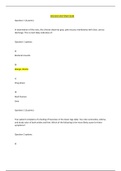
-
SOUTH UNIVERSITY NSG 5003 PATHOPHYSIOLOGY MIDTERM EXAM 2021 (2 VERSIONS): ADVANCED PATHOPHYSIOLOGY |100% CORRECT Q & A, DOWNLOAD TO SECURE HIGHSCORE|
- Exam (elaborations) • 86 pages • 2021
- Available in package deal
-
- $25.49
- + learn more
SOUTH UNIVERSITY NSG 5003 PATHOPHYSIOLOGY MIDTERM EXAM 2021 (2 VERSIONS): ADVANCED PATHOPHYSIOLOGY |100% CORRECT Q & A, DOWNLOAD TO SECURE HIGHSCORE| NSG5003 Midterm Exam / NSG 5003 Midterm Exam: Advanced pathophysiology: South University South University NSG5003 Midterm Exam / South University NSG 5003 Midterm Exam Question 1 (5 points) What causes the rapid change in the resting membrane potential to initiate an action potential? Question 1 options: Potassium gates open and potas...
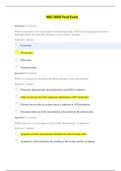
-
NSG 5003 Final Exam 1 - Latest version 100% Correct
- Exam (elaborations) • 19 pages • 2021
- Available in package deal
-
- $17.99
- + learn more
NSG 5003 Final Exam Question 1 (5 points) Which component of the cell produces hydrogen peroxide (H2O2) by using oxygen to remove hydrogen atoms from specific substrates in an oxidative reaction? Question 2 (5 points) What is a consequence of plasma membrane damage to the mitochondria? Question 3 (5 points) Which statement is a description of one of the characteristics of apoptosis? Question 4 (5 points) During cell injury caused by hypoxia, sodium and water move into the ...
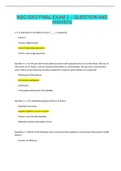
-
NSG 5003 FINAL EXAM 2 – QUESTION AND ANSWERS (Graded A+) LATEST UPDATE
- Exam (elaborations) • 53 pages • 2021
-
- $15.99
- + learn more
NSG 5003 FINAL EXAM 2 – QUESTION AND ANSWERS 1. It is important to not dilate the eye if ____ is suspected. Cataract Macular degeneration Acute closed-angle glaucoma Chronic open-angle glaucoma Question 2. 2. An 18-year-old female patient presents with repeated urinary tract infections. She has no risk factors in her history, and her physical examination is unremarkable. She also has a normal pelvic exam. Which of the following should be obtained if anat...
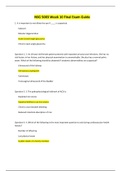
-
NSG 5003 Week 10 Final Exam Guide (193 Questions with Correct Answers) Guaranteed A Grade
- Exam (elaborations) • 53 pages • 2021
- Available in package deal
-
- $25.49
- + learn more
NSG 5003 Week 10 Final Exam Guide 1. It is important to not dilate the eye if ____ is suspected. Question 2. 2. An 18-year-old female patient presents with repeated urinary tract infections. She has no risk factors in her history, and her physical examination is unremarkable. She also has a normal pelvic exam. Which of the following should be obtained if anatomic abnormalities are suspected? Question 3. 3. The pathophysiological hallmark of ACD is: Question 4. 4. Which of the followin...
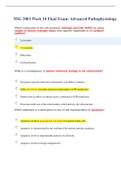
-
NSG 5003 Week 10 Final Exam: Advanced Pathophysiology
- Exam (elaborations) • 18 pages • 2021
- Available in package deal
-
- $15.99
- + learn more
NSG 5003 Week 10 Final Exam: Advanced Pathophysiology Which component of the cell produces hydrogen peroxide (H2O2) by using oxygen to remove hydrogen atoms from specific substrates in an oxidative reaction? What is a consequence of plasma membrane damage to the mitochondria? Which statement is a description of one of the characteristics of apoptosis? During cell injury caused by hypoxia, sodium and water move into the cell because: What is an effect of ionizing radiation exposure? options: chap...
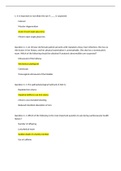
-
NSG 5003 Week 11 Final Exam 2.100% correct
- Exam (elaborations) • 53 pages • 2021
-
- $43.49
- + learn more
NSG 5003 Final Exam 1. It is important to not dilate the eye if ____ is suspected. 2. An 18-year-old female patient presents with repeated urinary tract infections. She has no risk factors in her history, and her physical examination is unremarkable. She also has a normal pelvic exam. Which of the following should be obtained if anatomic abnormalities are suspected? 3. The pathophysiological hallmark of ACD is: 4. Which of the following is the most important...
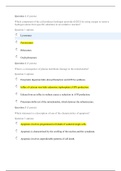
-
NSG 5003 FINAL EXAM.LATEST UPDATE
- Exam (elaborations) • 19 pages • 2020
- Available in package deal
-
- $19.49
- 3x sold
- + learn more
NSG 5003 Final Exam Week 10: Advanced Pathophysiology: Which component of the cell produces hydrogen peroxide (H2O2) by using oxygen to remove hydrogen atoms from specific substrates in an oxidative reaction? What is a consequence of plasma membrane damage to the mitochondria? Which statement is a description of one of the characteristics of apoptosis? During cell injury caused by hypoxia, sodium and water move into the cell because: What is an effect of ionizing radiation exposure? options: ch...
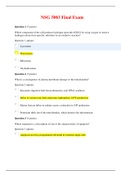
-
NSG 5003 FINAL EXAM / NSG5003 FINAL EXAM (VERSION-1, LATEST- 2020): ADVANCED PATHOPHYSIOLOGY: SOUTH UNIVERSITY |100% CORRECT ANSWERS, DOWNLOAD TO SCORE A|
- Exam (elaborations) • 19 pages • 2020
- Available in package deal
-
- $18.49
- + learn more
NSG5003 Final Exam / NSG 5003 Final Exam: Advanced pathophysiology: South University South University NSG5003 Final Exam / South University NSG 5003 Final Exam Question 1 (5 points) Which component of the cell produces hydrogen peroxide (H2O2) by using oxygen to remove hydrogen atoms from specific substrates in an oxidative reaction? Question 1 options: Lysosomes Peroxisomes Ribosomes Oxyhydrosomes Question 2 (5 points) What is a consequence of plasma membrane damage to the mitocho...
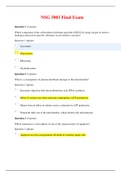
-
SOUTH UNIVERSITY NSG5003 ADVANCED PATHOPHYSIOLOGY FINAL EXAM 2020 (VERSION-1)|100% CORRECT ANSWERS, DOWNLOAD TO SCORE A|
- Exam (elaborations) • 19 pages • 2020
- Available in package deal
-
- $18.49
- + learn more
NSG5003 Final Exam / NSG 5003 Final Exam: Advanced pathophysiology: South University South University NSG5003 Final Exam / South University NSG 5003 Final Exam Question 1 (5 points) Which component of the cell produces hydrogen peroxide (H2O2) by using oxygen to remove hydrogen atoms from specific substrates in an oxidative reaction? Question 1 options: Lysosomes Peroxisomes Ribosomes Oxyhydrosomes Question 2 (5 points) What is a consequence of plasma membrane damage to the mitocho...

Do you wonder why so many students wear nice clothes, have money to spare and enjoy tons of free time? Well, they sell on Stuvia! Imagine your study notes being downloaded a dozen times for $15 each. Every. Single. Day. Discover all about earning on Stuvia


